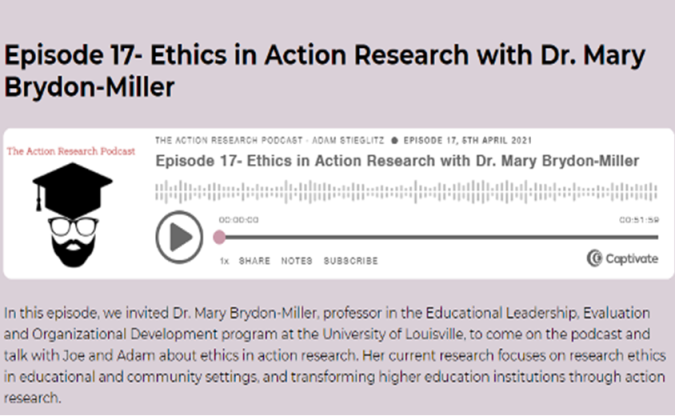Summary
This article is a review of an episode of the Action Research Podcast. In Episode 17, co-hosts Adam Stieglitz (PhD candidate) and Dr. Joe Levitan talked with Dr. Mary Brydon-Miller about some of the tricky concepts like navigating power differentials as an action researcher; conventional versus covenantal ethics; challenges within IRB and the human subject review system; ethical imperialism; and why we need a new system to evaluate ethics in action research.
Context
The Action Research Podcast is a way to bring academic endeavors, particularly research initiatives, to life. Each episode offers rich dialogical engagement between co-hosts Adam and Joe and renowned action researchers from the field. Topics discussed range from deconstructing reflexivity to democratizing education to acting to learn and learning to act. Ultimately, the Action Research Podcast is meant to be an engaging resource for scholars, students, and practitioners alike.
Ethics in Action Research: AR Podcast Episode 17
In this episode, we invited Dr. Mary Brydon-Miller, professor in the Educational Leadership, Evaluation and Organizational Development program at the University of Louisville to come on the podcast and talk with Joe and Adam about ethics in action research. Her current research focuses on research ethics in educational and community settings and transforming higher education institutions through action research. The conversation opens with introductions and getting to know who Mary Brydon-Miller is as an action researcher. As one of the seminal figures in the field, she first shares her answers to some foundational questions: What is action research? How has action research shifted over the years and what are the issues this field faces? How has she navigated power differentials as an action researcher? What is collaboration in action research and how have traditional or more conventional ethics in research differed or diverged from ethical consideration in action research? These important questions and key debates are discussed in this episode.
The questions at the heart of this podcast are: what is action research, how do people engage in quality action research, and how might action research contribute to a better world? We try to understand these questions from different perspectives offered by guests in our podcast. In the words of Mary, Action research is a work in progress. She explains, “action research is a form of knowledge generation that is founded in the belief that people in communities, people in organizations, students in schools know their own experience better than we can. To generate knowledge that’s going to be useful in creating change and promoting social justice, we need to be in collaboration with people in ways that really honour their knowledge and expertise.” The essence of collaboration in action research lies at the intersection of some of the core values of this paradigm such as respect, honesty, relationship building, trust, reciprocity, recognition and many more.
To dive into these tricky concepts, we discuss some of the important works Mary has written over the years. For example, in a 2003 article written with Greenwood and Maguire, the authors define core values of action research as “a respect for people and for the knowledge and experience they bring to the research process, a belief in the ability of democratic processes to achieve positive social change, and a commitment to action” (p. 15). In response to this definition, the co-hosts ask: How has action research shifted over the years and what are the current issues? To which Mary responds, “…conversation now about things like neo-liberalism is more sophisticated than before, and the way we are dealing with the politics…issues of racial justice have come more to the fore, but we still need a lot more people of colour who are involved in doing action research.” Action research is indeed a work in progress, progress towards more progressive social change and equitable structures and to move towards that social change, we need to build bridges between theoretical work, like critical race theory, and action research paradigms.
The vision of action research, no matter what field it is based in, is situated in the core philosophy that thoughtful action driven by the community itself will lead to a better world. Action driven by a community largely depends on relationship building and negotiating power differences. In the episode Mary discusses how she has navigated power differentials as an action researcher: “…people in the community are building relationships, are coming up with the ideas and part of what our action research project does is to take us into the community to talk to people in those towns about what they need to see happen.…”, which shows how relationship building helps to navigate some of these tricky power differential issues. Caring, equitable relationships also make action research more democratic. Speaking of democratisation in action research, this episode made me think about what collaboration is in action research and how traditional or more conventional ethics in research differ or diverge from ethical considerations in action research. This was also what the co-hosts were thinking because later in the episode, Adam and Joe raise a question about ethics in AR. Mary responds, “…I think what we need to do is just develop an entirely new system for evaluating the ethics of action research, which is what I tried to do with the structured ethical reflection process…I think there are huge ethical issues in action research.” The conversation ends with a discussion on how action research can establish its own ethical approach as a field, and focus on thinking through how AR needs to align with one’s own moral compass. This way, action researchers can discuss the ways in which we can create a more equitable and sustainable agenda for social research.
Link to hear Episode 17: https://the-action-research-pod.captivate.fm/episode/episode-17-ethics-in-action-research-with-dr-mary-brydon-miller
Note. If you have your own questions about Action Research or want to share any feedback, contact us on Twitter @The_ARpod or write to us at ActionResearchPod@gmail.com.
References
Brydon-Miller, M. (2007). Ethics and Action Research: Deepening our Commitment to Principles of Social Justice and Redefining Systems of Democratic Practice. In P. Reason &H. Bradbury (Eds.), Handbook of Action Research (2nd ed.) (pp. 199-211). Sage Publications.
Brydon-Miller, M. (2009). Covenantal Ethics and Action Research: Exploring a Common Foundation for Social Research. In D. Mertens & P. Ginsberg, The Handbook of Social Research Ethics (pp. 243–258). Sage Publications. https://doi.org/10.4135/9781483348971.n16
Brydon-Miller, M., Greenwood, D., & Maguire, P. (2003). Why Action Research? Action Research, 1(1), 9–28. https://doi.org/10.1177/14767503030011002
To cite this work, please use the following reference:
Diwakar, S. (2021, April 14). Ethics in Action Research: AR Podcast Episode 17. Social Publishers Foundation. https://www.socialpublishersfoundation.org/knowledge_base/ethics-in-action-research-ar-podcast-episode-17/

